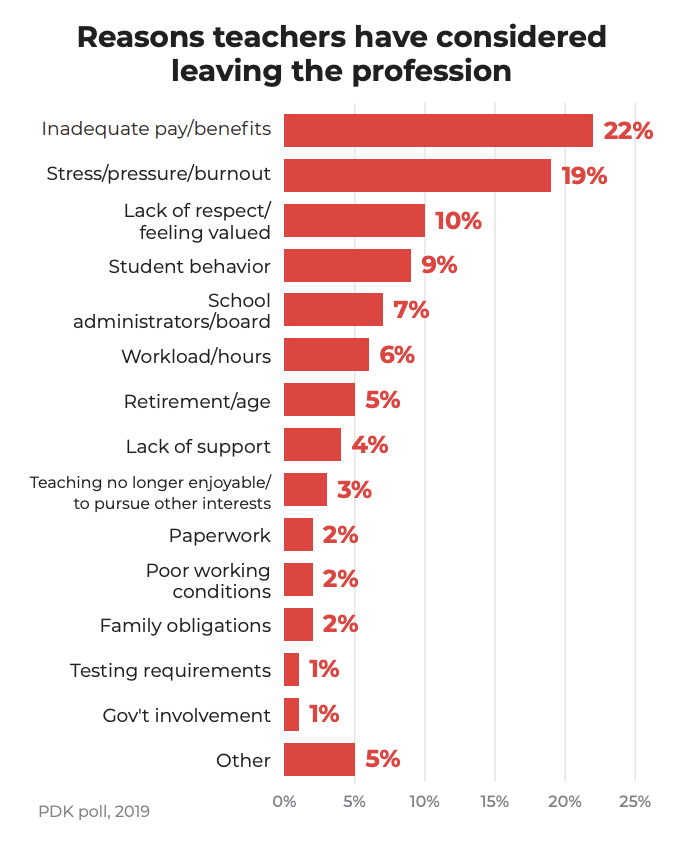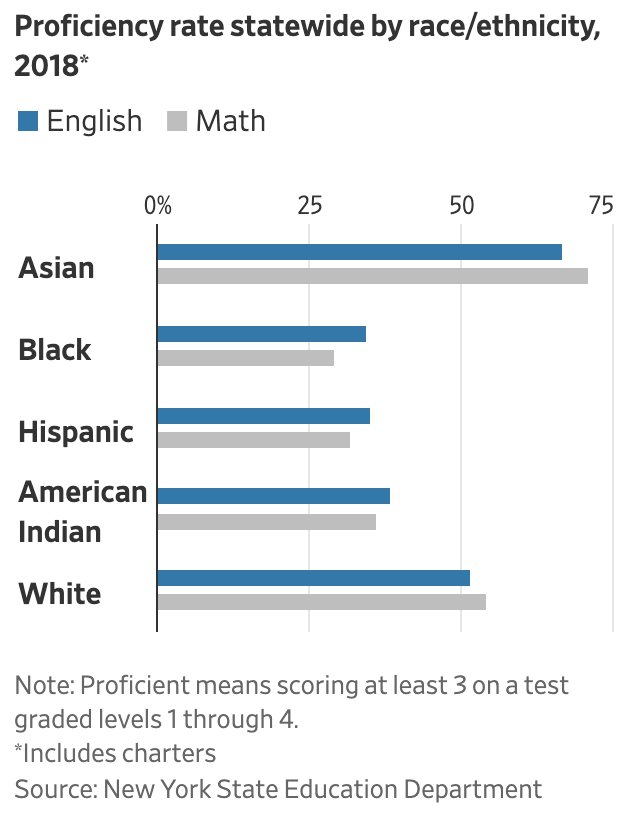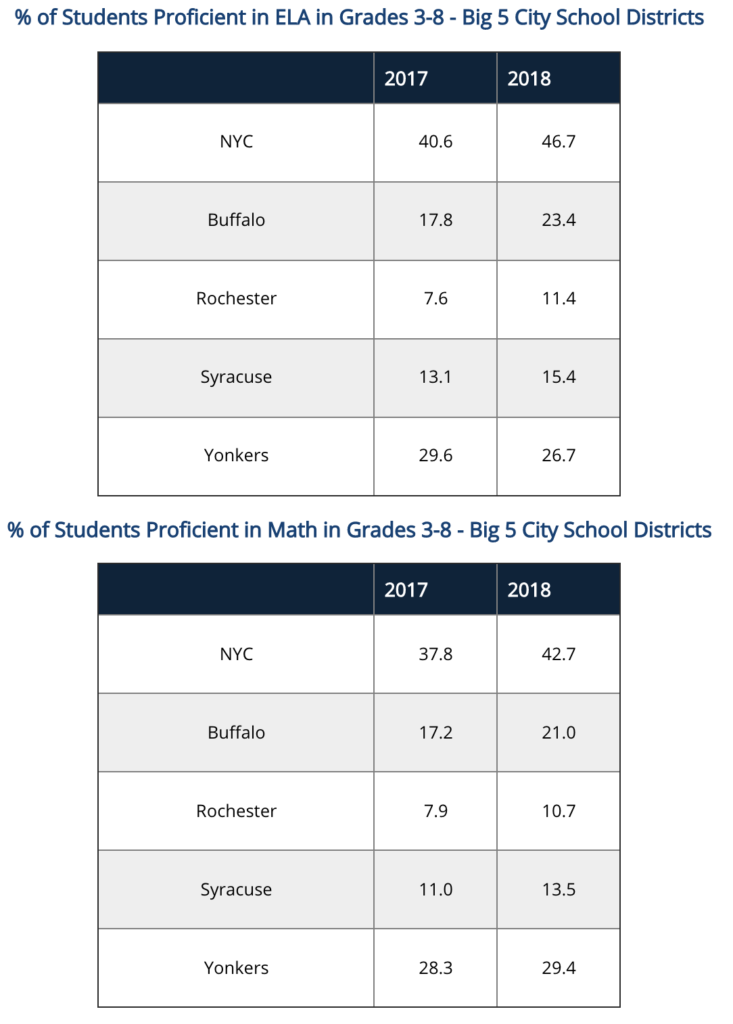
Aug 13, 2019 12:00:00 AM
Last week I made what I thought was a simple request: for all of us to prioritize the question “how are the children?” as if our nation depends on it. This week I want to offer an example of why that request isn’t so simple after all.
It started as it often does in my world, with a tweet from a teacher who sees education reform as the enemy, and its advocates as a direct threat to teachers. Fighting for better student achievement is comparable to attacking teachers.
In this case, it was Gary Rubinstein, a New York City teacher who had all his buttons pushed when Teach For America tweeted a story in The 74 about a new PDK poll that shows declining morale among America’s teachers.
His response was to claim that a “big part of low teacher morale is anti-teacher propaganda by [The 74] and spread by TFA,” he said. I challenged that claim as “silly” to which he said, “Sorry you feel left out. Education Post also contributed to teacher morale crisis, but not as much as The 74.”
In the spirit of fair debate, I pushed Gary to either provide evidence of Education Post contributing to “low teacher morale” or to apologize to the good people on my team and in our network. We provide a platform for parents, students and educators who have every right to be heard, and none of them deserve the idle libel of a fragile teacher working at a selective magnet school (which, as far as I’m concerned, looks basically like a publicly funded, elite private school).
For the record, the PDK poll itself points out the basis for low teacher morale (Education Post, The 74 and Teach For America aren’t on the list):

He sidestepped my request for evidence or an apology over and over, but when cornered he finally offered his weak sauce as decisive proof: “Your most recent post is a perfect example of what I'm talking about. Implies adults in education don't care about children. That sentiment lowers morale.”
There you have it. My insistence on putting us all on the hook for child welfare and academic results is an affront to some teachers—Mr. Rubinstein in particular—whose feelings are hurt.
And, I don’t give a damn. No champion of children should be cowed by this maddening, privileged, and culturally narcissistic twaddle that too often stunts debate and raises unnecessary barriers against keeping the main thing the main thing.
In case you’ve forgotten since that recent post last time I wrote to you, that “main thing” is students and their opportunities to learn and thrive.
Teachers have obvious grievances that need to be addressed, but the true victims of American public education are the tiny citizens who come out of a 13-year system with only 5 years of learning, who are disqualified from 4 years of college, who are consigned to a lifetime of reduced income and diminished potential.
How would the world be different if all of us, including Gary, spent more time asking how the children are in our own state or city school systems, instead of attacking the integrity of people who are asking, “How are the children?”
If we look at Gary’s home state of New York, we see that in New York City’s public schools less than half of students are proficient in English language arts or mathematics (despite the fact that New York spends the most per pupil in the nation at $23,000 per student).
Here are New York state’s proficiency rates displayed by race:

If you really want to depress yourself, consider the fact that New York City’s poor student outcomes are the best of the state’s biggest 5 districts:

And, this is the part where education statists like Gary interject refrains about the poverty, parents and segregation causing the problems, to which I’ll point out that the racialized problem with proficiency exists even in “integrated” wealthy schools that aren’t burdened with concentrations of poverty or supposedly bad parents.
The fact that New York prepares so few students to be proficient readers and mathematicians causes a problem closer to home for Gary, where his school, Stuyvesant High School admits students based on reading and math test scores. That results in newspaper headlines announcing “Only 7 Black Students Got Into Stuyvesant, N.Y.’s Most Selective High School, Out of 895 Spots” and “8 Elite Public Schools in NYC Only Accepted 190 Black Students.”
He also might want to check in with the Black students who actually make it through the test-score entrance gate, because it appears they have a thing or two to say about their experience right under Gary’s nose.
Here’s what one Black student wrote about his time at Stuyvesant:
Just because students are intelligent enough to pass a test doesn’t mean they understand people who might be ethnically, racially or culturally different. That’s what happened to Gordon in his freshman biology class when his lab partner blamed him for the AIDS virus. Or when he was told to “go back to Africa” because he disagreed with some of his peers on the merits of the Specialized High Schools Admission Test.
I have to wonder if Gary spends as much time addressing these problems as he does attacking those who do?
Raising these issues shouldn’t make any education advocacy organization the target of calumny and detraction. It’s what we’re supposed to do. Our schools aren’t working for too many people and the stakes for that failure are too high a societal cost for any of us to ignore.
If asking how the children are hurts your feelings you might as well prepare for a life of hurt, because the question will remain relevant to me until every child gets a fitting and useful education that sets them up for a personally meaningful life.
An award-winning writer, speaker, and blogger, Chris Stewart is a relentless advocate for children and families. Based in outstate Minnesota, Chris is CEO of brightbeam, a nonprofit media group that runs campaigns to highlight policies and practices that support thriving kids. He was the founding Director of the African American Leadership Forum, was an elected member of the Minneapolis Board of Education, and founded and served as the CEO of Wayfinder Foundation. Above all, Chris is a serial parent, a Minecraft enthusiast, and an epic firestarter on Twitter where he has antagonized the best of them on the political left and right. You’ll often see Chris blogging at citizenstewart.com and “tweeting” under the name “Citizen Stewart.”
Few issues in education spark more tension and debate than standardized testing. Are they a tool for equity or a burden on students? A necessary check on school systems or a flawed measure of...
Charter schools are public schools with a purpose. Operating independently from traditional school districts, they're tuition-free, open to all students, and publicly funded—but with more flexibility...
Despite the benefits of a diverse teaching force, prospective teachers of color fall out of our leaky preparation pipeline at every stage: preparation, hiring, induction, and retention. Here’s what...
Ed Post is the flagship website platform of brightbeam, a 501(c3) network of education activists and influencers demanding a better education and a brighter future for every child.
© 2020-2025 brightbeam. All rights reserved.
Leave a Comment